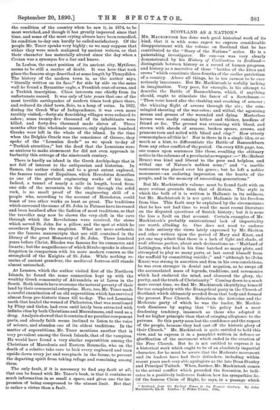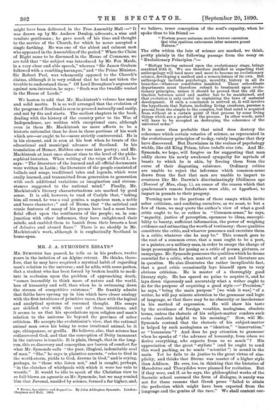SCOTLAND AS A NATION.*
Ma. MACKINTOSH has done such good historical work of its kind, that it is with some regret we express considerable disappointment with the volume on Scotland that he has contributed to the "Story of the Nations" series. He is a painstaking investigator. He can—as was very clearly demonstrated by his History of Civilisation in Scotland— distinguish between history as a record of human progress, and history as a narrative of those "battles of the kites and crows " which constitute three-fourths of the earlier patriotism of a country. Above all things, he is too earnest to be ever seriously inaccurate. But Mr. Mackintosh is wofully lacking in imagination. Very poor, for example, is his attempt to describe the Battle of Bannockburn, which, if anything should, ought to stimulate the fancy of a Scotehman:— " Then were heard afar the clashing and crashing of armour ; the whizzing flight of arrows through the air ; the com- mingled shouting of the war-cries ; and withal, the agonising moans and groans of the wounded and dying. Masterless horses were madly running hither and thither, heedless of friend or foe. The ground was streaming with blood, and strewn with shreds of armour, broken spears, arrows, and pennons torn and soiled with blood and clay." How utterly commonplace all this is ! Nor is there in it a single idea, or so much as a hint, to differentiate the Battle of Bannockburn from any other conflict of the period. On every fifth page, too, one comes upon sentences like these, recalling the obituary notice in the columns of a provincial newspaper :—" He (Robert Bruce) was kind and liberal to the poor and helpless, and withal one of Nature's noblest sons ;" and "a marble monument was placed over his grave ; but he left a nobler monument—an enduring impression on the hearts of the people, and in the memory of succeeding generations."
But Mr. Mackintosh's volume must be found fault with on more serious grounds than that of diction. The style in which the bulk of it is written is Hallamic in its coldness, but Mr. Mackintosh it is not quite Hallamic in his freedom from bias. This fault may be explained by the circumstance that he has not had time to read the most recent literature on the disputed questions of Scotch history; but it is none the less a fault on that account. Certain examples of Mr. Mackintosh's probably unintentional lack of impartiality are worth alluding to. One does not need to endorse in their entirety the views lately expressed by Mr. Skelton and other writers upon the period of Mary and Knox, and yet one may admit that there is a lack of light and shade, of audi alteram part em, about such declarations as: "Maitland of Lethington, who had in his time hatched so many plots, and attempted to play so many parts, at last saved himself from the scaffold by committing suicide ;" and "although he (John Knox) was strong in assertion and firm in his own convictions, he was even stronger in denial and negation, as he swept off the accumulated mass of legends, traditions, and ceremonies which had enslaved the mind, and obscured the glory, the purity, and the truth of Christianity." Coming down to a much more recent time, we find Mr. Mackintosh identifying himself far too completely with the Evangelical party in the Church of Scotland, which ultimately seceded from that body and formed the present Free Church. Robertson the historian and the Moderate party of which he was the leader, Mr. Mackin- tosh dismisses by saying that "his policy had a most deadening tendency, inasmuch as those who adopted it had no higher principle than that of cringing allegiance to the patrons. So this party soon lost the confidence and the respect of the people, because they had cast off the historic glory of their Church." Mr. Mackintosh is quite entitled to hold this view, and to express it in a pamphlet written in defence or glorification of the movement which ended in the creation of the Free Church. But he is not entitled to express it in a historical work which ought to be of an absolutely impartial character, for he must be aware that the Moderate movement and its leaders have had their defenders, including within recent years such very able apologists as the late Dean Stanley and Principal Tulloch. When, further, Mr. Mackintosh comes to the actual conflict which preceded the Secession, he indi- cates in a positively ludicrous fashion how his sympathies lie. Of the famous Claim of Right, he says, in a passage which • Scotland, from the Earliest Times to the Present Century. By John Mackintosh, LL.D. London : T. Fisher Morin. 1590.
might have been delivered in the Free Assembly HAll --" It was drawn up by Mr. Andrew Dunlop, advocate, a wise and resolute gentleman ; he gave much of his time and thought to the service of the Church, for which he never accepted a single farthing. He was one of the ablest and calmest men who appeared in the Assemblies of the period." When the Claim of Right came to be discussed in the House of Commons, we are told that "the subject was introduced by Mr. Fox Maule, in a very clear and able speech," whereas "Sir James Graham followed with a rambling harangue," and "the Prime Minister, Sir Robert Peel, was vehemently opposed to the Church's claims, although it is very evident that he had not taken the trouble to understand them." Of Lord Brougham's arguments against non-intrusion, he says : "Such was the twaddle vented in the House of Lords."
We hasten to add that Mr. Mackintosh's volume has many and, solid merits. It is so well arranged that the evolution of the progress of Scotland is seen to proceed naturally and easily, and not by fits and starts. The earliest chapters in the book, dealing with the history of the country prior to the War of Independence, are written with exceptional care, although even in them Mr. Mackintosh no more affects to be a historic rationalist than he does in those portions of his work which are—or ought to be—more strictly controversial. He is in his element, and is seen at his best when he treats of the educational and municipal advance of Scotland. In his translation of Homer, Hobbes once rose into poetry ; and Mr. Mackintosh at least once almost rises to the level of the philo- sophical historian. When writing of the reign of David I., he says : "The literature of the learned and all official documents were written in Latin ; the literature of the people consisted of ballads and songs, traditional tales and legends, which were orally learned, and transmitted from generation to generation with such additional variations as imagination and circum- stances suggested to the national mind." Finally, Mr. Mackintosh's literary characterisations are marked by good sense. It is odd, however, to read of Carlyle that, "taking him all round, he was a real genius, a sagacious man, a noble and brave character;" and of Burns, that "the satirical and comic features of many of his poems have had a most bene- ficial effect upon the sentiments of the people; as, in con- junction with other influences, they have enlightened their minds, and enabled them to banish from their breasts a host of delusive and absurd fears." There is no shoddy in Mr. Mackintosh's work, although it is emphatically Scotland in home-spun.



































 Previous page
Previous page